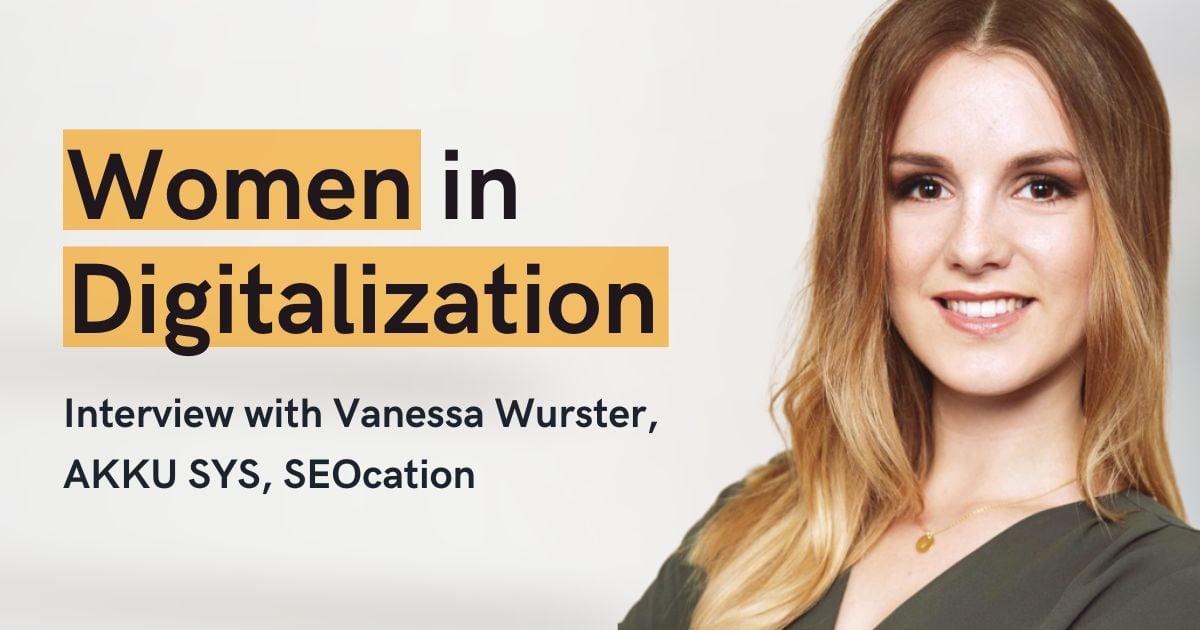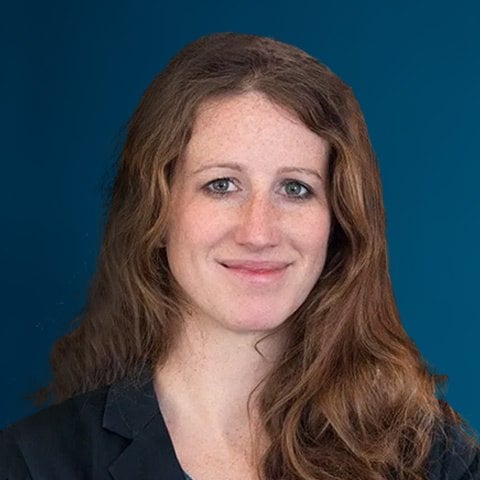E-Commerce | Customer Stories | Auto-Updating Copy | Automated Texts + Product Descriptions
Women in Digitalization: Interview with Vanessa Wurster from AKKU SYS
Reading Time 8 mins | April 11, 2023 | Written by: Heike Hoppmann

Everyone is talking about digitalization. But who is behind the projects? What's happening behind the scenes at companies? To find out, we turned to the pioneers of digitalization. Vanessa Wurster is Head of E-Commerce at AKKU SYS, founder of SEOcation, and a lecturer. In this interview, she reveals how she juggles it all and why the digitalization can be both: Metaverse and SharePoint.
Vanessa, why don't you introduce yourself to our readers?
For me, it all started eight years ago with search engine optimization, back then at Otto. I'm currently Head of Online Marketing at AKKU SYS, where I work on various cross-departmental projects. However, I missed the deep dive into SEO topics. Therefore, in addition to my work as a lecturer at the University of Applied Sciences Karlsruhe and the IHK, I therefore started my own business with my business partner Lisa at the beginning of 2023 to advise clients in the field of SEO. I enjoy the diversity of my work and see it as a great opportunity to get involved in different areas and grow.
Congratulations on becoming self-employed. That certainly takes a lot of energy and courage. How do you manage to juggle everything?
Yes, it takes a lot of courage. We also spent a long time thinking about how to take this step. I think pretty much everyone who has ever founded a start-up has doubts at the beginning. The classic questions play a role, such as: How do we go about it? What do we have to do?
We took our time to plan and organize everything thoroughly. My employer AKKU SYS was very supportive and allowed us to work part-time by reducing our working hours. So, a big thanks for this!
Now we have enough time to work on our own projects. It is an exciting and challenging time, but I am very happy to have taken this step. I have to say that both are a lot of fun: On the one hand, learning about SEO and diving deep into the subject, and on the other hand, moving the company forward strategically.
So that we can imagine it a little better: What does a workday look like for you?
Yes, that's the beauty of it: No two days are the same for me. It would be absolutely boring for me to do exactly the same thing every day. For example, if there is a big project coming up, I might focus more on my work at AKKU SYS. Then the self-employed work takes a back seat. Of course, it can also be the other way around.
A big part of my work is the exchange with other departments and the cooperation in interdepartmental projects. In the area of digitalization in particular, we are looking at how we can reposition ourselves as a company and which systems we should use to do so. What I find particularly exciting is that these solutions should be used for the entire department and the entire company. Workshops or meetings can sometimes last several hours in order to cover all aspects.
On other days, however, I work full time for our new company, focusing on various customer projects. Each project is unique and requires different steps, so I have to plan and structure my day accordingly. It is therefore difficult for me to describe a daily routine, as every day is different. Nevertheless, I really enjoy working on these different tasks and thus having a varied workday.
And what is important to you in a work environment?
It's definitely very, very important to me that I enjoy what I’m doing. I wouldn't take the step into self-employment if I didn't enjoy it so much. Anyone who is self-employed knows how much work is involved and that you can't just put your feet up and relax in the evening.
I don't want to do my job just so I can get money at the end of the month. Sure, that's a goal, but for me it's more than that. Especially in the field of digitalization, e-commerce, online marketing, and SEO, I'm interested in constant change and trying out new ideas and approaches. Of course, it's also important to complete projects and not just have many ideas. It's also important to me to monitor results and to make data-based decisions, not just to follow trends because of a gut feeling.
Keyword "trend": Given the fast pace and abundance of new developments in the field of digitalization, how do you distinguish what is relevant and important?
I think that not every trend is suitable for every company. The one trend that is garbage for one company can have an incredibly high added value for another. You should always keep the needs of the company in mind and not blindly follow every new trend.
It is important to stay curious, but also to pay attention to the basics. Especially in the area of digitalization, it often makes more sense to optimize outdated processes first before turning to new technologies. Personally, I find it exciting to try out all the possibilities, but you also have to be realistic and focus on the really important problems.
You should always inform yourself and then assess for yourself what is needed now: Is this a trend that I need to jump on right now? Is it enough to inform myself about it and somehow stay up-to-date, or do I have to implement it right away? – There's no one-size-fits-all answer.
Digitalization, SEO, automation, AI. These are all areas where a lot is happening very quickly. How do you deal with that as a lecturer? How do you communicate a fast-moving topic in a sustainable way?
The lectures I give are about SEO. And yes, it's very fast-moving, but it also includes a lot of fundamentals. You have to build them up first. I always emphasize the importance of analyzing numbers and staying on top of things. And I explain how Google has changed over the years: How did SEO work in the past and how does it work today? How has it changed? What updates have been made? These questions can be used to illustrate its evolution. Just so you get an idea and see the potential.
As an SEO lecturer, I also teach: It doesn’t help if I've read 30 articles on a topic. You really have to do it yourself, because that's how you learn the most. And again, not everything works equally well on every website. What works well on one website may not work well on another. For this, I bring super many examples from practice. I think that's the best way to learn.
Would you call yourself a digitalization driver?
Hmm, what does it actually take to be a digitalization driver? In our company, I would say that I am a driver of digitalization. And not just in the sense of automated content generation. But also in the area of communication, for example. How teams communicate with each other digitally. So much depends on digitalization. This includes the question of how we work together.
And what kind of reactions do you get when you introduce new digital work processes?
It depends. Digitalization is often associated with a major change process. Anyone who has ever been through a change process in a company knows that there are always points that don't suit everyone. I mean, people are creatures of habit, and change is not always the most pleasant thing for all of us. Because we leave our comfort zone and change the way we work, which we may have done the same way for years. Or the problem may not have been recognized at all yet, or the change process may require a lot of effort before the change brings relief to our daily work.
And there are always points that come up. It can be something as small as: We now have teams as a communication channel, or we use SharePoint instead of a normal filing system. We wouldn't call that a huge step in digitalization, but others might. The question here is: Where does digitalization start? People react differently depending on the context in which they are affected by the change. What is a problem for one person may be an afterthought for another.
Can your home environment understand what you do professionally?
Something on the Internet. Or something with online stores and marketing. Sometimes online marketing is already too much. It always depends on who I'm talking to. The other day I had to write down what I do for my grandma because she couldn't remember.
On the subject of careers in the field of digitalization: It's a rather male-dominated environment, what are your experiences?
It always depends on the area. I started out in an SEO team, which is a more technical area. There were very long phases when I was the only woman in the team. Then I worked in the content and social area. There are often a lot of women in the teams, so it's a relatively diverse mix. There is still a large surplus of men. But I'm noticing that there are more and more women on the stage at conferences, even on technical topics. That makes me happy every time. But I also believe that there's more to come!
On the subject of careers: I think there's a lot you can do, and it's also very individual what career means to you. For me, a career isn't just about climbing up the management ladder somehow. Even though I like to take on a leadership role, be responsible for other people and work at a strategic level.
I think many people forget that there is also a professional career and that you can take on an expert role. One is not better or worse than the other, but for me those are two paths. Personally, I try to take both paths by having a leadership role internally within the company and by moving into the expert role through self-employment. The important question to answer is this: Do you want to position yourself broadly or deeply? And there are so many possibilities in this area, especially in SEO.
Dear Vanessa, thank you very much for the interview, it was a lot of fun.
This interview is part of our series “Women in Digitalization”. In the interviews, we get exciting insights into the career paths of women in the technology industry and learn how they are shaping the future of digitalization. They talk about their experiences and offer advice for women in the industry. Read our other interviews here:
Heike Hoppmann
Heike Hoppmann believes in the power of words. The use of words can be creative, but above all it must be purposeful. Writing is not an end in itself. As a mentor and coach for editorial management and digital transformation processes, she has successfully conveyed this idea to many online editors. And today it is the guiding principle of her work as PR Manager at AX Semantics GmbH.

